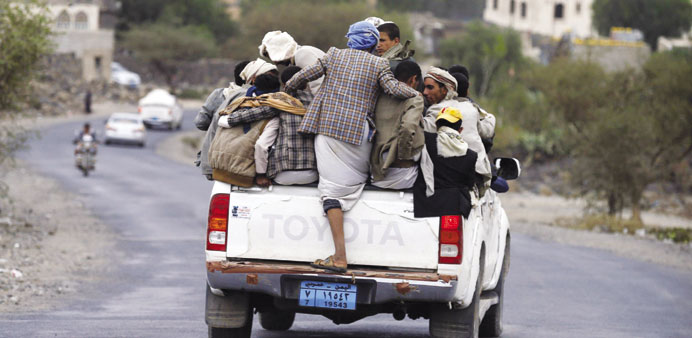People ride on the back of a truck on a road linking Sanaa with the northwestern city of Amran yesterday. Fuel shortages in Yemen have caused hikes in taxi fares, forcing many to ride in overcrowded vehicles.
Reuters/Geneva
The United Nations hopes to massively scale up aid to Aden now that fighting has all but stopped in the Yemeni port city, the UN official in charge of humanitarian aid to Yemen said after a weekend trip to the city.
Johannes van der Klaauw said he saw bodies lying in the street and whole districts damaged or destroyed, but the battle between the Houthi militia and local fighters backed by a Saudi-led air campaign had moved north.
“The fighting has stopped. What you hear and what you know is that in the north and west of the city there are air strikes to push the Houthis further inland and away from the city.
“There are still some snipers on the (Aden) peninsula - the Houthis have not all withdrawn apparently. But I do think that in the coming days the city itself will be free from risk of further fighting.”
Van der Klaauw said conditions were good enough for the UN to move back with an international presence and government officials, who fled Yemen in late March and have just started to return, thought Aden was not at risk of a Houthi counter-attack.
“It seems that the big battle is much more now for Taez,” he said, referring to a city to the north which he said the UN was extremely concerned about.
UN aid trucks have been abandoned at the Rabat checkpoint outside Aden because shelling and fighting had made it too dangerous for the drivers to guard them. A five-day ceasefire that began at midnight on Sunday was a chance to get them moving, he said.
“We urgently need to get that area deconflicted with the suspension of hostilities so that these trucks - hopefully they’re still not looted - can get into the city.”
Despite the truce, fighting continued in several parts of the country, but there were no immediate reports of heavy fighting near Aden itself.
Local UN staff have been trapped in their houses for months. UN offices - unreachable since March - have been partly damaged, and all the UN assets and a fleet of a dozen vehicles have been seized.
A hospital run by Medecins Sans Frontieres was full of wounded civilians, not people involved in fighting. Hospitals are only treating trauma, with no primary healthcare or help for chronic diseases or maternity, he said.
Van der Klaauw met Yemen’s ministers of public works and transport in Aden to discuss the priorities for restoring normal life to the city, where a quarter of the 800,000 residents have been displaced, leaving some areas as “ghost districts”.
Four cabinet ministers arrived in Aden last week as part of an effort to restore state control, a Yemeni politician said, four months after President Abd-Rabbo Mansour Hadi fled into exile in Saudi Arabia.
Apart from policing the peace, the first priorities are getting displaced people back to their homes, restoring water and sewage systems, electricity, public health and other basic services, and providing shelter for those who need it.

